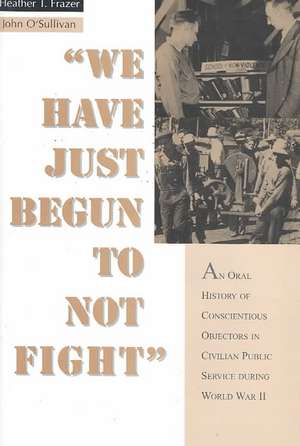Oral History Series: An Oral History of Conscientious Objectors in the Civilian Public Service During Worl: Twayne's Oral History, cartea 0018
Autor Heather Frazer John O'Sullivanen Limba Engleză Hardback – 31 dec 1995
Preț: 392.67 lei
Nou
Puncte Express: 589
Preț estimativ în valută:
75.14€ • 78.01$ • 62.66£
75.14€ • 78.01$ • 62.66£
Carte indisponibilă temporar
Doresc să fiu notificat când acest titlu va fi disponibil:
Se trimite...
Preluare comenzi: 021 569.72.76
Specificații
ISBN-13: 9780805791341
ISBN-10: 0805791345
Pagini: 268
Dimensiuni: 161 x 242 x 28 mm
Greutate: 0.64 kg
Editura: Twayne Publishers
Seria Twayne's Oral History
ISBN-10: 0805791345
Pagini: 268
Dimensiuni: 161 x 242 x 28 mm
Greutate: 0.64 kg
Editura: Twayne Publishers
Seria Twayne's Oral History
Textul de pe ultima copertă
World War II stands, for most Americans, as the "good" war; it was a necessary war fought for a just cause. Yet more than 40,000 American men refused to fight the war. Citing principled opposition, they declared themselves conscientious objectors. Rejecting combat duty, the men served as noncombatants in the military, performed alternative civilian service, and in some cases took an absolutist position and went to prison. "We Have Just Begun To Not Fight" is devoted to the nearly 12,000 men who entered Civilian Public Service (CPS) with the intent to perform "work of national importance" as an alternative to combat duty. CPS men worked as aides in mental hospitals, volunteered as smoke jumpers in forest fires, and participated in grueling medical and scientific experiments. They were a remarkably diverse group - blue-collar workers, college professors, Amish farmers, and Pulitzer Prize winners - motivated by a wide range of philosophical and political beliefs. Religious fundamentalists, anarchists, absolutists, socialists, and Father Coughlinites came together in the 151 CPS camps scattered throughout the country. The communities they created in the camps, as well as their encounters with the local, often hostile communities surrounding them, are a largely unexamined aspect of wartime America. Authors Heather T. Frazer and John O'Sullivan record the oral histories of 15 CPS men and 2 CPS wives whose recollections and reflections impart a rich understanding of this exercise of conscience in wartime.






